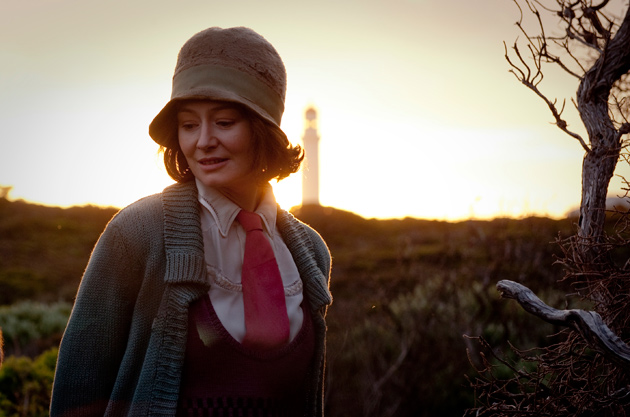|
South Solitary is a
rugged, remote island “off the mainland” of Australia. Despite the
strong winds howling from the Antarctic, this bleak, blustery rock in
the sea does have enough vegetation to support livestock and food
necessary for the two lighthouse keepers, including the wife and two
children of one.
It is
difficult as a viewer not to associate landscape with character. You
really have to wonder what kind of people would choose to live in a
place like it. They either enjoy being alone or have exhausted most
opportunities afforded by living amongst people for various reasons. It
is with such suspicion and unease I approached the inhabitants.

Miranda Otto, windswept and distant in “South Solitary”
South Solitary is set in 1927 and opens with mid-30s Meredith
(Miranda Otto) carrying a lamb (quite a prattling and superficial
symbol) in a rowboat onto the island, escorted by a seasick uncle
(played by Otto’s father, Barry Otto). He has been sent by the
Commonwealth light-house service to examine reports of substandard
operations of the light-house. He is all starch and proper procedure,
casting a harsh and unfriendly energy on those around him. With Miranda,
it’s due to love, we are told.
He
gets to work reforming the two current keepers. Rohan Nichol plays the
married young father Harry Stanley. We can understand his urges—a man
on an island—and we can understand where those urges lead
once a new woman appears, but it’s instead the more complex and troubled
WWI veteran, Jack Fleet (Marton Csokas), that slowly distils Meredith’s
interest.
Writer/director Shirley Barrett became intrigued when reading old
light-house logs from various islands around Tasmania. In an era before
radio, the isolation was very great and even pigeons were used to send
messages. The film was actually shot in Portland in mainland Victoria
due to the realities of production, but it doesn’t alter the stunningly
stark look and feel of the blasted surrounds.
The
acting is good and there are quite moving scenes, especially one between
the two women. However, there is an uneasy sense at the end of the
glacially-paced story that nothing much happened. I walked out thinking
that there was so much that could have been done. People, alone
on an island, in the middle of nowhere... and what we get is the
equivalent of microwave dinner for one.
Could
there have been, at least, a predictable happy-ending-love-story that
makes everyone feel giddy? Instead there’s a deliberate, contrived
effort to be off-centre but in a cutesy, non-confronting way. There are
elements to be enjoyed, but it feels like a half-baked, going-nowhere
film, as flimsy, flighty and irritating as the lead character. |